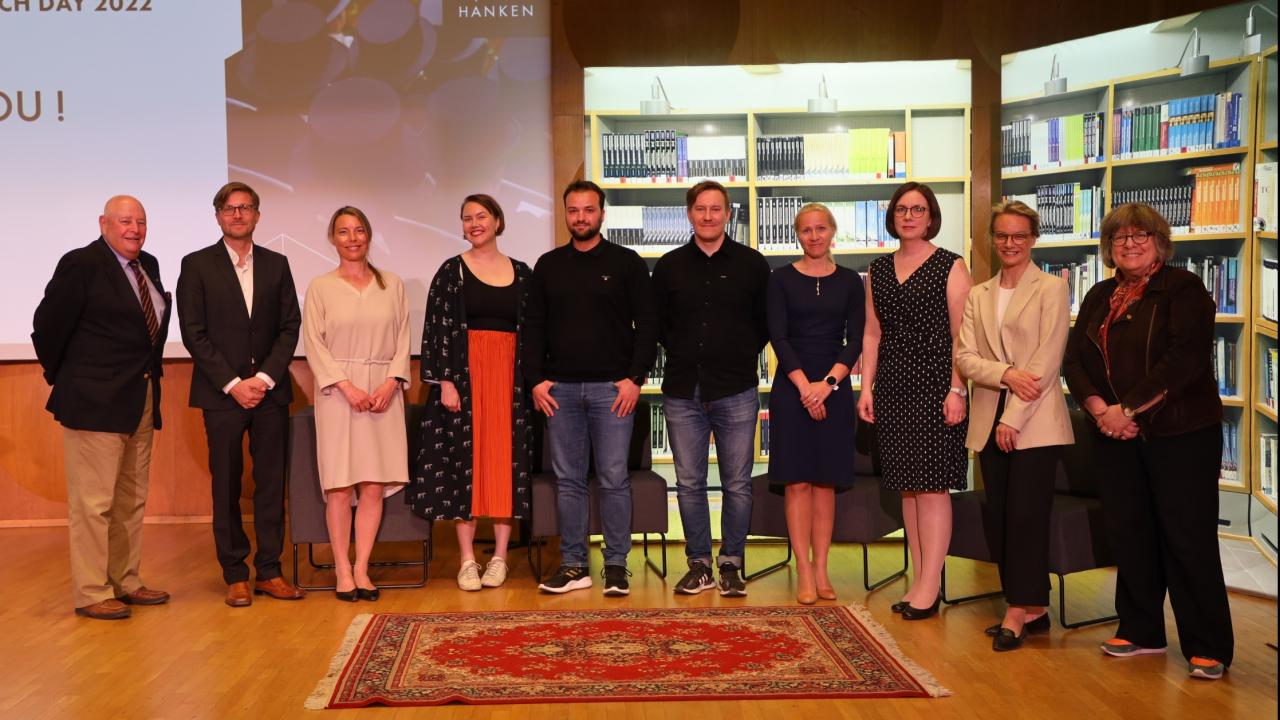Hanken Research Day 2022: Research for a more sustainable world

Sustainable last mile deliveries
Hanken is coordinating the i-SMILE project Opens in new window which purpose is to increase sustainability in urban last mile deliveries by understanding how innovations in urban last-mile may reduce the negative effects of e-commerce and at the same time create world-class delivery services for consumers.
In her presentation Anna Aminoff, Associate Professor in Supply Chain Management and Social Responsibility, pointed out that there has never been a greater change regarding last mile deliveries in the cities than during the pandemic.
“For example, food e-commerce increased by 36% in Finland last year, and research shows that consumers, especially younger adults, want the deliveries faster and faster”, says Anna Aminoff.
The last delivery mile is the most expensive and pollutive part of the supply chain. The number of vans in cities is growing which leads to not only air pollution but also other problems in the city centers.
“There is more noise, congestions and accidents and we must not forget the delivery worker’s health and safety issues. According to estimates there will be almost 40% more vans in the cities in 2030 compared to now.”
One solution to the problem is delivery robots, such as a parcel locker that moves around an area, from which consumers can pick up their parcels when it suits them best. This kind of autonomous delivery robot has been piloted in the Jätkäsaari district of Helsinki by LMAD Opens in new window and Forum Virium Opens in new window .
Hanken’s collaboration within the project revolved around a survey, which was sent out to residents in Jätkäsaari. According to the survey people appreciated the flexibility of choosing when and where to pick up their parcels. However, the sustainability aspect of the robot was not that very well recognized. The respondents were also somewhat worried about the safety of their packages, although the robot is not that different from a normal parcel locker. Overall, people were positive towards this pilot project.
Equalizing opportunities in education and science
Ari Hyytinen, Professor of Economics, talked about the WINST project (Women in Science and Technology) Opens in new window at Hanken Research Day. As a part of the project Ari Hyytinen and his colleagues studies innovators’ careers. Hyytinen presented preliminary research results from a new working paper called Parental Education and Invention: The Finnish Enigma.
“We know from before that parental income is strongly positively related with children becoming inventors, i.e. the person named in a patent document. The probability of children becoming inventors in high income families is 4-8 times higher than in low-income families”, says Ari Hyytinen.
Hyytinen explains that the same pattern can be seen in Finland and in the US, both in the past and more recently. Unlike the US, Finland has low income inequality, high social mobility and free education. This means, that in Finland, parental income should not predict the probability of inventing as strongly as it does in the US.
“According to our paper, what seems to actually matter is the parents’ education, not income.”
In their research, Ari Hyytinen and his colleagues found a large causal effect of parental education on offspring´s probability of becoming an inventor. In the 1960s and 1970s several new universities were established in Finland, which led to reduced distance to some parents’ universities and that increased their likelihood of getting a university degree.
“We also found out that the causal effects vary by gender. The causal impact of parental education on daughters turns out to be larger in relative terms than on sons, because the level of female inventors was so low initially”, says Ari Hyytinen.
The future of sustainable investing
In her presentation at Hanken Research Day Hanna Silvola, Associate Professor of Accounting, talked about sustainable investing. Silvola presented results from a survey in collaboration with Nordnet about private people investing sustainably.
“According to the survey 60% thinks that sustainable investing is worth doing. The respondents told us that about 45% of their current portfolio consists of sustainable investments and they expect that it will be 57% in five years”, says Hanna Silvola.
The survey shows that women and young men tend to invest in a more sustainable way. People investing sustainably are usually well educated, live in cities and quite often have kids. Swedish-speaking Finns invests sustainably more often than Finnish-speaking people.
“Here in Finland, we really don´t talk about money and this also shows in the survey. 79% said that they don´t consult any experts about investing. They rather make their own choices or find information online. Consulting the internet is even more popular than talking to a friend or colleague.”
At the end of Hanken Research Day Hanna Silvola led a panel discussion with Bonnie Buchanan, Head of Department of Finance and Accounting at the University of Surrey, Janna Haahtela, Portfolio Manager at Fondita Fund Management and Emilia Vähämaa, Associate Professor of Finance at Hanken.
You can watch the discussion and the full recording here:
Hanken Research Day 2022 - Impacting society through collaboration Opens in new window
Read more about the project H2 Ecosystem Roadmap in an interview with project manager Kaisa Penttilä here:
Hanken studies commercialization of green hydrogen in Ostrobothnia Opens in new window
More information about the research projects:
Text: Jessica Gustafsson
Photo: Alina Anderson

